A year in the life 1805
A
glorious year for England opened with Napoleon the newly crowned Emperor of
France promising to save Europe from 'the nation of shop-keepers'. But the
moment of truth was delayed until October, when Nelson and his fleet destroyed
the French navy at Trafalgar. Turner was one of the first on board when the
flagship Victory brought the admiral's body home to a hero's funeral.
In
London the talk over Christmas and the New Year was of Master William Betty,
the boy actor. 'You would not think,' wrote one society hostess, as the
fashionable world flocked to see the boy prodigy, 'that Europe was in a state
of warfare and bondage'. Of the warfare there was no doubt, for Britain had
been at war with France for the greater part of the past 12 years. But the
bondage was a matter of opinion.
NAPOLEON THE LIBERATOR
To the
Prime Minister of Britain, William Pitt, France was filled with 'unbounded
schemes of aggrandizement and ambition', which it was Britain's duty to oppose.
However, there were plenty of people in Germany, Italy and the Low Countries,
who welcomed Napoleon's all-conquering troops as liberators.
Recently
crowned Emperor of the French and soon to be crowned King of Italy, Napoleon
claimed to be saving Europe from Britain that 'nation of shop-keepers', which
had 'op-pressed France for six centuries' and ridden rough-shod over the rights
of neutral countries, seizing their shipping and burning their ports. While
France and other European nations lived frugally off their own natural
resources, Britain had acquired great wealth by plunder and power. Having come
nearer to uniting Europe than any man had done for a thousand years, Napoleon
felt that it was his duty to scotch the threat presented to the rest of Europe
by 'perfidious Albion'.
Britain,
not unnaturally, saw it differently. While the French had through revolution
sought 'liberty, equality and fraternity' but found only the tyranny of
Napoleon Bonaparte Britain had resisted such extremes and had remained loyal to
King George Ill. This had not always been easy, for George ill often conferred
with the oak trees in Windsor Park. The King, it was also rumoured, was mean a
quality the British public disliked in their monarchs.
ROAST BEEF OF ENGLAND
In
February 1805, however, it was announced that 'a most magnificent entertainment
was given by their majesties at Windsor Castle', which had not been equalled by
any since they came to the throne, at a cost to the taxpayer of an estimated
£50,000. Then in April the King did even better, and gave a feast featuring the
'roast beef of old England'. He personally ordered a baron of beef for the
occasion, which weighed a mere 1621b, and took some ten hours to cook.
The
last time France had threatened invasion, half a century before, artists such
as Hogarth had been on hand to produce paintings and engravings of roast beef
and to explain its significance as the symbol of the liberties of free-born
Englishmen. Now such things were out of date. Instead, the galleries were
filled with seascapes Turner's among them showing war-ships riding out storms
in distant seas in pursuit of the wicked Frenchies. The press meanwhile, struck
a common chord with fulsome praise for the ordinary British seamen or 'Jolly
Jack Tars' as they called them and on whom, it was claimed, the country's
security depended.
But the
reality was sometimes different. There was the case, for example, of a sailor
called Campbell who was sentenced to 150 lashes for desertion and the
forfeiture of his share of the prize money taken from a captured enemy ship. As
soon as Campbell had taken his punishment, his shipmates between them made up
for him the sum he would have received.
SPAIN'S PACT WITH FRANCE
At the
end of April an article in a Madrid newspaper, widely circulated in England,
claimed that the Spanish government in concert with France was embarking on 'a
vast plan of military operations, the execution of which will give a deadly
blow to the power of England'. Earlier that year Napoleon had made a treaty
with Spain putting at his disposal 32 first-rate Spanish warships. What
everyone wanted to know was, what use would be made of them? And what was this
'vast plan'?
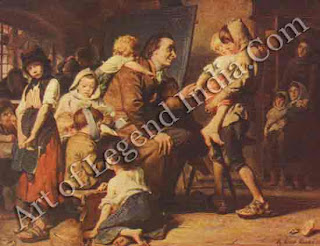 At
first it seemed that the objective was an attack on the West Indies, in an
attempt to cripple Britain's trade and cause sufficient financial panic in the
City of London to bring down the government. Villeneuve, commander of the
French Mediterranean fleet, slipped through the Straits of Gibraltar and sailed
across the Atlantic with the British admiral Lord Nelson in pursuit. Then in
July, as both Villeneuve and Nelson reappeared in home waters, it became clear
that the aim was to gather the French and Spanish fleets in the Channel to
cover an invasion. 'If we are masters of the Straits of Dover for twelve
hours,' wrote Napoleon, 'England is no more.
At
first it seemed that the objective was an attack on the West Indies, in an
attempt to cripple Britain's trade and cause sufficient financial panic in the
City of London to bring down the government. Villeneuve, commander of the
French Mediterranean fleet, slipped through the Straits of Gibraltar and sailed
across the Atlantic with the British admiral Lord Nelson in pursuit. Then in
July, as both Villeneuve and Nelson reappeared in home waters, it became clear
that the aim was to gather the French and Spanish fleets in the Channel to
cover an invasion. 'If we are masters of the Straits of Dover for twelve
hours,' wrote Napoleon, 'England is no more.
Unfortunately
for the French, it was not to be. The French Atlantic fleet failed to get out
of Brest to join Villeneuve, who retreated south with the Spanish to Cadiz.
Then in September, Napoleon's 'Army of England', assembled at Boulogne for the
invasion, was ordered to break camp and March against Russia. The danger of
invasion was over.
NELSON'S VICTORY
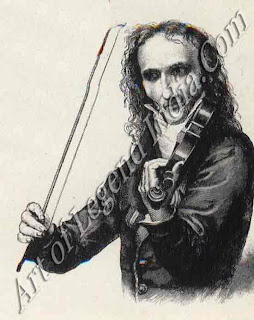 That
autumn when Nelson left Portsmouth, crowds knelt in the streets as he went on
board his flagship, HMS Victory. On 21 October, off Cape Trafalgar to the south
of Cadiz, he caught up with Villeneuve's 18 ships and the Spanish fleet of 15.
'It is annihilation the country wants', he wrote, 'and not merely a splendid
victory.' His 27 ships broke the enemy's line of battle and captured or
destroyed 22 of them. The other 11 crept back to Cadiz and stayed there for the
rest of the war. It was Nelson's finest victory and his last. He was shot
through the spine early in the battle, and died a hero's death.
That
autumn when Nelson left Portsmouth, crowds knelt in the streets as he went on
board his flagship, HMS Victory. On 21 October, off Cape Trafalgar to the south
of Cadiz, he caught up with Villeneuve's 18 ships and the Spanish fleet of 15.
'It is annihilation the country wants', he wrote, 'and not merely a splendid
victory.' His 27 ships broke the enemy's line of battle and captured or
destroyed 22 of them. The other 11 crept back to Cadiz and stayed there for the
rest of the war. It was Nelson's finest victory and his last. He was shot
through the spine early in the battle, and died a hero's death.
England
has saved herself by her exertions,' opined Pitt, the Prime Minister, 'and will
save Europe by her example.' He was wrong about the example at least. In
December Napoleon defeated Austria and Russia, thus making himself master of
the continent. The British would not believe it, so turned to their dead hero,
whose body was brought back on board HMS Victory Turner met the ship at
Sheerness and went aboard to make sketches for a battle picture and given a
magnificent state funeral in London on 9 January 1806.
Writer
– Marshall Cavendish
 At
first it seemed that the objective was an attack on the West Indies, in an
attempt to cripple Britain's trade and cause sufficient financial panic in the
City of London to bring down the government. Villeneuve, commander of the
French Mediterranean fleet, slipped through the Straits of Gibraltar and sailed
across the Atlantic with the British admiral Lord Nelson in pursuit. Then in
July, as both Villeneuve and Nelson reappeared in home waters, it became clear
that the aim was to gather the French and Spanish fleets in the Channel to
cover an invasion. 'If we are masters of the Straits of Dover for twelve
hours,' wrote Napoleon, 'England is no more.
At
first it seemed that the objective was an attack on the West Indies, in an
attempt to cripple Britain's trade and cause sufficient financial panic in the
City of London to bring down the government. Villeneuve, commander of the
French Mediterranean fleet, slipped through the Straits of Gibraltar and sailed
across the Atlantic with the British admiral Lord Nelson in pursuit. Then in
July, as both Villeneuve and Nelson reappeared in home waters, it became clear
that the aim was to gather the French and Spanish fleets in the Channel to
cover an invasion. 'If we are masters of the Straits of Dover for twelve
hours,' wrote Napoleon, 'England is no more. That
autumn when Nelson left Portsmouth, crowds knelt in the streets as he went on
board his flagship, HMS Victory. On 21 October, off Cape Trafalgar to the south
of Cadiz, he caught up with Villeneuve's 18 ships and the Spanish fleet of 15.
'It is annihilation the country wants', he wrote, 'and not merely a splendid
victory.' His 27 ships broke the enemy's line of battle and captured or
destroyed 22 of them. The other 11 crept back to Cadiz and stayed there for the
rest of the war. It was Nelson's finest victory and his last. He was shot
through the spine early in the battle, and died a hero's death.
That
autumn when Nelson left Portsmouth, crowds knelt in the streets as he went on
board his flagship, HMS Victory. On 21 October, off Cape Trafalgar to the south
of Cadiz, he caught up with Villeneuve's 18 ships and the Spanish fleet of 15.
'It is annihilation the country wants', he wrote, 'and not merely a splendid
victory.' His 27 ships broke the enemy's line of battle and captured or
destroyed 22 of them. The other 11 crept back to Cadiz and stayed there for the
rest of the war. It was Nelson's finest victory and his last. He was shot
through the spine early in the battle, and died a hero's death. 
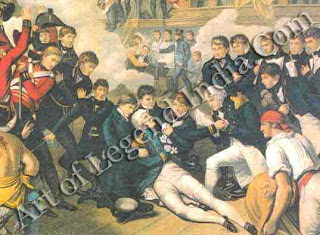
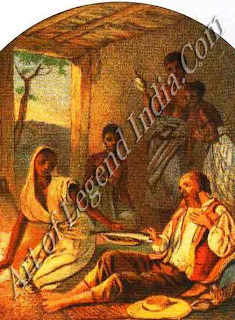
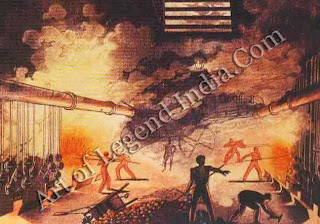











0 Response to "British Great Artist Joseph Turner - A year in the life 1805 "
Post a Comment